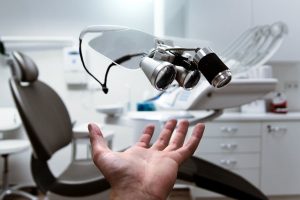5 Tips on Dealing with Your Dental Anxiety

Going to the dentist can be an unnerving and uncomfortable experience. It’s never ideal to have tools, hands, and strange tastes in your mouth. Some people may avoid the dentist all together because of their dental anxiety. However, it’s important that even if you have a fear of the dentist, that you make an effort to visit the dentist regularly.
Regularly dental visits are important to your overall dental health. Dental anxiety can lead to dental emergencies which in turn can cause a patient to require more dental treatment. As a dentist who has worked with many patients in the past 17 years, I am aware of how real your dental anxieties may be.
It’s my goal to make sure every patient is comfortable and relaxed throughout their visit, that’s why I’ve compiled a list of ways to help you work to overcome your fear of the dentist.
#1. Identify your fear
What is it about going to the dentist that gives you anxiety? It could be a number of things. Fear of needles, the drills, pain, or a combination of many different elements. Some patients become worried that a dentist might be rushed and neglect their concerns. Negative memories of the dentist can also be a factor in one’s anxiety. It’s important to identify your fears and know what about the dentist scares you so you can work begin working towards a solution. If you’re feeling helpless about overcoming your dental fears, stay hopeful. A solution is out there it’s just a matter of finding what works best for you.
#2. Talk to your dentist
Once you have identified what causes you anxiety at the dentist, it’s best to set up a time to speak with your dentist about them. Expressing your concerns will help your dentist adapts the treatment to your needs. Also, your dentist is a great resource for support as you begin to overcome your dental fears and will want to help you in any way that they can. Many dentists have their own methods of helping to ease their patients’ anxieties.
Your dentist may use simple methods to enhance your feeling of control. They’ll begin by gently explaining what you will feel, and for how long. Throughout the appointment, they will frequently ask you for permission to continue with the procedure. At any time during the appointment, a dentist will give you the opportunity to stop the procedure is your feeling uncomfortable. You will also be able to take breaks as requested. Always remember that your dentist wants to help you have a healthy mouth and will do what they can to ensure this.
#3. Consider dental sedation
Dental sedation can be beneficial to patients that have severe dental anxiety. Your dentist will use medication to help you relax during your dental visit or procedure. There are four different types of sedation that your dentist may use. They include:
Inhaled minimal sedation: Your dentist will use nitrous oxide, sometimes known as laughing gas, combine with oxygen through a mask that’s placed over your nose. This will help you relax during your appointment.
Oral sedation: Oral sedation can range from minimal to moderate, depending on the dose that’s given. For minimal sedation, you will take a pill. The pill will make you drowsy, but you will still be awake. A larger dose for moderate sedation is the type of anesthesia most commonly associated with sedation dentistry. Some people may fall asleep during the procedure but can be awakened easily.
IV moderate sedation: The sedative drug is given through a vein, so it works more quickly. It relaxes you while allowing the dentist to continually adjust the level of sedation.
General Anesthesia: These medications make you almost or totally unconscious. You cannot be awakened under general anesthesia and will not wake up until the effects of the medication wear off or reversed with other medication.
Sedation dentistry can help you receive the care you need if you are feeling strong anxiety towards the dentist. Talk to your dentist about which sedation methods they offer and which one will be best for you. Your dentist will do what is needed to make sure you are comfortable enough to make regular dental visits and prevent dental emergencies.
#4. Bring someone with you
It may be helpful for you to bring someone you’re close with to the dentist with you. Going to the dentist with someone you trust can provide you with a great deal of comfort during your visit. Whether it’s a friend or family member, they can be with you throughout your appointment to provide you with support. Many dentists will even let friends or relatives sit with patients during their appointment so they can have that comforting feeling throughout the entire visit. Talk to your dentist about bringing someone with you to your visits until you feel comfortable to go it alone.
#5. Find distractions
Using distractions during your dental appointment is a great way to help you forget some of your dental anxieties. Most dental offices are already equipped with some distractions such as chair side TVs that play movies or TV shows. If your dentist doesn’t have one, ask if you can bring an iPad, tablet, or portable DVD player to watch something during your appointment. Wearing headphones and listening to music is another great distraction as it blocks out the sounds of the dental tools and allows you o focus on whatever you’re listening to.
Overcoming your fear of the dentist is possible, but it may take time. Never give up on facing your fears. Regular dental visits are essential to your overall oral health and are the best way to avoid serious dental emergencies. If you do find yourself in a dental emergency, visit emergencydentist247.com to receive immediate help.
In your journey to overcoming your dental fears, talk to your dentist, as they want you to be able to be confident during your dental appointments. Find what works for you when it comes to overcoming your anxieties and be proud of yourself for the progress you make.






